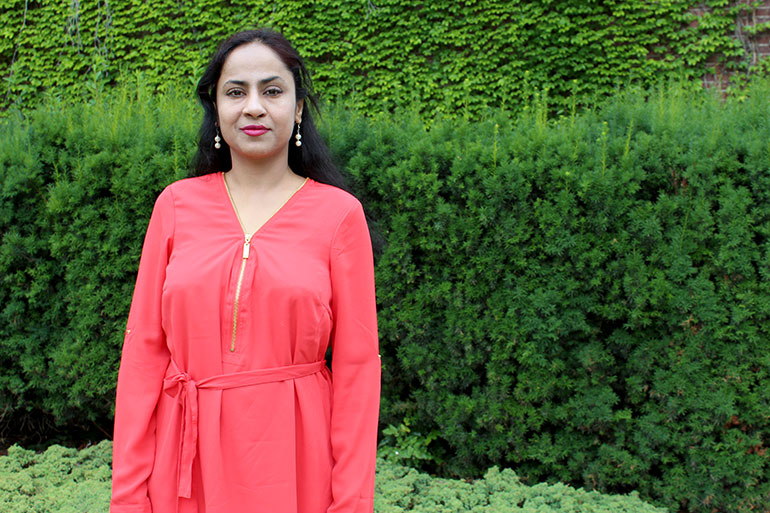
Each year, UBCO organizes a number of activities during Jump Start as the first step in making international students feel at home.
Study encourages all-encompassing learning environments
It’s back to school time, and more than 580 of this year’s newest UBC Okanagan students are from various countries around the world.
In fact, UBCO is home to students who represent 106 various countries. Romi Jain, a postdoctoral fellow with UBC Okanagan’s Faculty of Management, has recently published research that outlines specific recommendations to ensure all students feel welcome and comfortable in a classroom
It’s not uncommon for international students to experience dissonance while at school, she explains, especially if they are faced with learning materials which might contradict their perceptions and beliefs.
“Dissonance can be described as the state of having inconsistent thoughts, beliefs or attitudes, relating to behavioural decisions or attitude change,” she explains. “If not harnessed, such dissonance can be at the heart of their unresolved dilemmas, unspoken feelings, and unshared stories, facts and experiences.”
Published recently in Writing and Pedagogy, her paper encourages all-encompassing learning environments. She notes, there has long been an international emphasis on intercultural education, but it does not guarantee inclusivity in the classroom.
Jain’s research is based partially on her own first-hand experiences, but also from interviews with instructors at a university in a Midwest American city and existing literature relevant to her study.
Some unintentional examples that might create dissonance for an international student include instructors believing a student is quiet because they don’t want to participate in class discussions, or a basic struggle to understand a foreign accent. And she notes, in some cultures it’s wrong to argue with people, so some students won’t engage in any debate regardless of how they feel.
Jain also explains that a teacher’s facial expressions while engaging with international students might reflect doubt, perhaps because the student is speaking a second language. On the same hand, the instructor’s facial expressions speaking with a domestic student may reflect validation or appreciation.
“In response, teaching needs to be designed to be inclusive and intercultural with a view to encouraging, unearthing and illuminating multiple perspectives to enrich and equalize the learning environment for both international and domestic students,” she says.
On the flipside, Jain says there is an opportunity for everyone in the classroom to benefit and learn from each other. Professors should use the cultural beliefs and backgrounds of international students to enrich the learning environments for all students.
Motivated faculty, she says, will find in dissonance an opportunity to stimulate the learning environment through constructive participation of culturally-diverse students in dialogue and discourse.
“Students may be carrying rich and interesting information and knowledge from their own cultures and can really contribute to class discussions,” she says. “However, sometimes for different reasons, they do not share. If they are encouraged to share, it will lead to richer conversations.”
Her paper provides strategies for instructors to enhance the classroom environment and encourage the sharing of new knowledge:
- Establish trust with international students, being aware how instructors interact with international students.
- Correctly pronouncing their names to show their presence, address them by name.
- Transition to an interactive classroom. After class, ask quieter students what they think about a topic to make them feel comfortable.
- Reading aid questions. Provide questions in advance to help international students prepare, especially with those struggling with language issues.
- Prepare syllabus depending on student backgrounds, to create a balanced course.
- Allow international students to submit multiple drafts of assignment.
- Discourage other students who laugh at mispronunciation of words.
- Allow all students to express personal feelings or academic concerns.
- Be conscious of body language, both the professors and students.
- Give feedback and encourage respectful dialogue between international and domestic students and form cross-cultural teams on assignments.
- Don’t spotlight international students as if they’re a representative of their community.
- Assign reflection papers on class discussion using a comparative perspective.
Each September, UBC Okanagan hosts Jump Start. The multi-day enhanced orientation is designed to introduce both international and domestic students to university life, connect with faculty and to find new friends. For more details on resources available to UBC’s international students visit: students.ok.ubc.ca/international-students

Romi Jain, a postdoctoral fellow with UBC Okanagan’s Faculty of Management.
About UBC’s Okanagan campus
UBC’s Okanagan campus is an innovative hub for research and learning in the heart of British Columbia’s stunning Okanagan Valley. Ranked among the top 20 public universities in the world, UBC is home to bold thinking and discoveries that make a difference. Established in 2005, the Okanagan campus combines a globally recognized UBC education with a tight-knit and entrepreneurial community that welcomes students and faculty from around the world.
To find out more, visit: ok.ubc.ca.